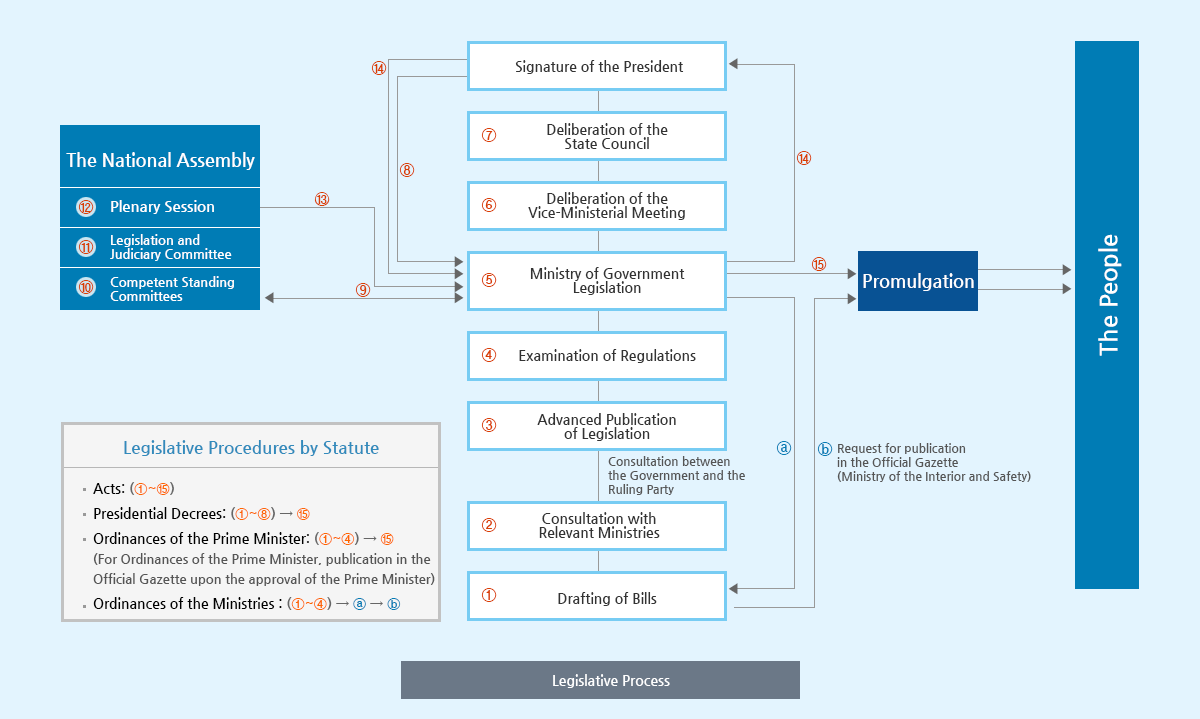Legislation procedures
Legislation procedures refer to a series of procedures ranging from the drafting of Bills to their promulgation. The Constitution of the Republic of Korea grants the National Assembly the power of legislation and permits the Executive branch, the Judicial branch, etc. to exercise lawmaking powers on subordinate statutes other than Acts. The power of legislating subordinate statutes is limited to matters delegated by Acts and matters necessary for the enforcement.

Legislation Process
| 1. Drafting of Bills | A central administrative agency drafts Bills on affairs under its jurisdiction. In cases of administrative affairs under the jurisdiction of at least two Ministries, such Ministries jointly draft a bill. |
|---|---|
| 2. Consultation with Relevant Ministries, and, if necessary, consultation between Government and the Ruling Party | After the drafting of any Bill is completed, consultations on the details of such Bill with relevant Ministries are required. If necessary, consultations between the Government and the Ruling Party or cooperation from opposition parties are to be sought. |
| 3. Advance Publication of Legislation | The legislation of Bills shall be published, in advance, to reflect various opinions of the people. The period of the advance publication is no less than 20 days. Anyone who holds an opinion on any Bill may put forth an opinion. However, advance publication may not be provided in special cases provided for by Statutes and regulations. |
| 4. Examination of Regulations | When any Bills include matters restricting the rights of the people or imposing obligation upon the people by the Government or local governments to achieve specific administrative objectives, the Regulatory Reform Committee must examine such Bills. |
| 5. Examination of Ministry of Government Legislation | The Ministry of Government Legislation examines not only the formal aspects of the relevant Legislation details, such as legal terms and phrases, but also practical aspects, such as whether they are realistically appropriate, whether they are in conformity with the goals of state affairs, whether they are in conflict with statutes of higher hierarchy or related institutions, etc. |
| 6. Deliberation in Vice-Ministerial Meeting | Vice-ministerial meetings deliberate on key matters of Bills in advance to be placed on the agenda of the State Council. However, in cases of emergency, any Bill may be placed on the agenda of the State Council without prior deliberation of vice-ministerial meetings. |
| 7. Deliberation in State Council | The State Council, a top policy deliberative organ, hears proposal explanation of Bills from competent ministries and after discussions, provides resolutions. |
| 8. Signing by the President | Approved Bills of the State Council and Presidential Decrees requires the signature of the President after the Prime Minister and the relevant members of the State Council countersign. |
| 9. Submission of Bills to National Assembly | Bills, signed by the President, are promptly submitted to the National Assembly by the Ministry of Government Legislation. |
| 10. Deliberation of Competent Standing Committees, and if Necessary, Examination of Committee of Full Members | When any Bill is proposed or submitted to the National Assembly, the Speaker reports it to the plenary session, refers it to the competent standing committee, and after the examination of the competent standing committee is completed, places it on the agenda of the plenary session. If necessary, any competent standing committee may examine specific Bills by commissioning sub-committees. For important Bills, a committee of all members may examine them. After the examination of a Bill is completed, it is referred to the Legislation and Judiciary Committee for review of legal terminology and phrases. Then, such Bill is to be deliberated upon and approved at the plenary session of the National Assembly. |
| 11. Examination of Legislation and Judiciary Committee | |
| 12. Deliberation and Resolution at the Plenary Session of National Assembly | |
| 13. Transfer of Bills to Government | The Ministry of Government Legislation prepares a draft promulgation of a Bill approved by the National Assembly. If any objection is raised to such Bill, the President may request that the National Assembly redeliberate on the Bill by attaching an objection statement within 15 days from the date when such Bill is transferred to the Government. |
| 14. Deliberation of State Council and Signing by the President | Legislation bills passed by the National Assembly require the signature of the President after the Prime Minister and the relevant State Council members countersign. Presidential Decrees require deliberation by the State Council, and the signature by the President after the Prime Minister and the relevant State Council members countersign. |
| 15. Promulgation | Such Bills are promulgated through publication in the Official Gazette. |